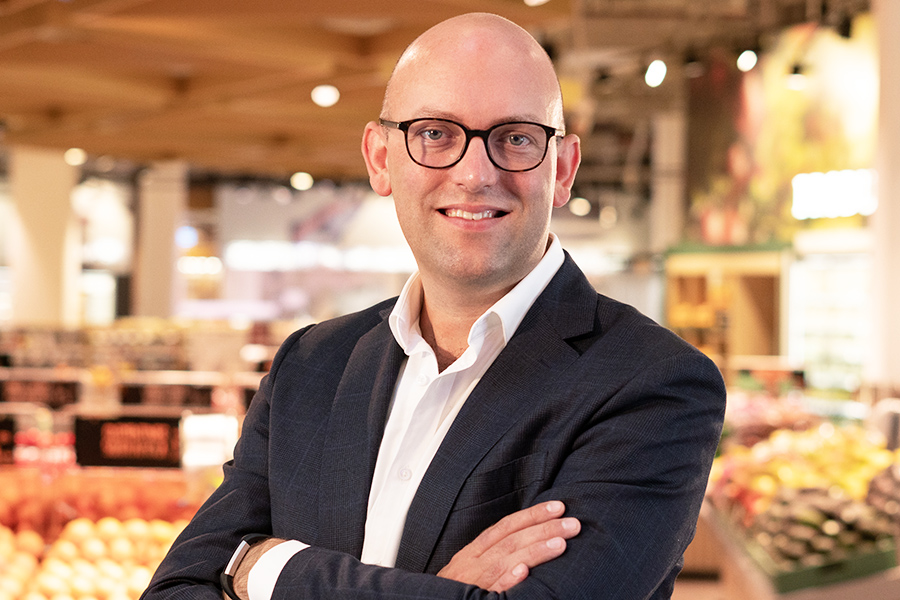
Tom Harvey, Commercial Manager, Spinneys
UAE-based supermarket chain Spinneys sees “dramatic changes” in shopping patterns since the COVID-19 pandemic broke out. Pointing towards a 500-ml Spinneys branded water bottle, commercial manager, Tom Harvey said, “This used to be one of our best-sellers. It’s still among our best-sellers but in 1.5-litre size. Not everyone is back at work yet; earlier our customers used to grab a bottle of water with a sandwich. Now, they prefer buying a bigger bottle.”
From January this year, Spinneys started noticing some early hints of unusual trading patterns in certain product categories, such as hand sanitisers. “We started preparing early to be able to handle a possible spike in demand for certain products. By the time we moved into March and April, and the pandemic manifested in the region, there was panic buying happening at Spinneys, and similarly across several parts of the world. There were dramatic changes in shopping patterns. As people stayed at home, they were eating out less and cooking at home more,” Harvey observes.
According to him, over the last decade, the general trend has been frequent grocery shopping – globally and regionally – buying less food in a single transaction, as people are being more conscious of food wastage and its impact on the environment. But the pandemic, especially the lockdown, has completely transformed this buying pattern. “During the 24-hour lockdown in Dubai, people could get a permit once in three days to do their grocery shopping. However, even after the lockdown, people are shopping less frequently, but a bigger basket size. The number of transactions has decreased, which is more planned now; while the average spending per transaction has increased. It is not a loss of customers in case of Spinneys and Waitrose; in fact, our market share has increased as we traded through the year. We have achieved a record level of market share this year,” Harvey explains.
A big surprise is a phenomenal growth in the frozen food category, which continues to stay in double-digit at Spinneys compared to pre-COVID levels. As people are buying less frequently, they want their food to last longer, coupled with the convenience that has increased demand in this category.
“We are not only closely looking at our share of trade in the grocery market, but also our share of stomach within the broader market as frozen food presented a good opportunity for people to cook a variety of dishes at home,” Harvey points out.
At the same time, there is also a clear movement towards healthy and whole foods. People are more willing to prepare their food from scratch. “That’s true,” Harvey says, “we have seen significant demand for rice, pulses, canned tomatoes that people need to assemble a meal. Home baking, globally, has also seen a huge spike.”
Moving over to a few other crucial factors, Harvey talks about the increased need for hygiene and cleanliness as well as traceability of food products. “These factors have always been very important to us. Customers consider these important factors before choosing their preferred grocery shopping destination. In our case, we have been very serious about offering not only a hygienic and clean environment but also the ability to trace products, as we source from farms and farmers with whom we have a great relationship. We have, thus, also been able to maintain good supply chain resilience, even amid the pandemic.”
Post-pandemic, food security has become a major focus area for the UAE. In this regard, Spinneys has been partnering with local growers much before the pandemic. And during the course of the pandemic, Spinneys launched an incubator programme for micro food and beverage (F&B) suppliers in the emirates. As part of its corporate sustainability initiative ‘Let’s Do Better Together’, the incubator programme aims to fast-track supermarket listings for innovative F&B businesses to support local food production and stimulate economic growth in the sector. The incubator programme attracted submissions from more than 160 local businesses. Of these, 22 brands will be fast-tracked onto Spinneys’ shelves, and two more companies have been accepted into the product development programme.
“With increased food production happening in the region, we are strongly committed to the UAE’s food security efforts. We received an overwhelming response to our incubator programme, which was in the making for the last 18 months; it wasn’t a reaction to COVID-19. But it got accelerated due to the pandemic, as we realised that many small businesses were suffering. The first set of products from these local brands will hit our shelves from late October 2020,” Harvey states.
Finally, in line with the demand for online grocery shopping, Spinneys launched its online shopping platform in June. “We debated and discussed the possibility of launching an online platform. Think about it, supermarkets are supposed to be places where customers can do self-service. It becomes an expensive operation to use our human resources to do the picking and packing, coupled with doorstep delivery. There have been concerns about profitability, but ultimately, we realised that customers need the online grocery shopping facility. So, we decided to offer them an end-to-end service, all done in-house. We will launch an online platform for Waitrose too very soon,” Harvey shares.
However, the company’s digital transformation roadmap isn’t altering its brick-and-mortar expansion plans. “Our brick-and-mortar expansion plans won’t change,” Harvey confirms. “We have expanded this year, opening a few Waitrose outlets at Motor City, in the midst of the pandemic, and then at Al Barari. More stores are due to open in the coming weeks. We are constantly looking for the best sites to get closer to our customers. The online channel will expand our reach, thereby supporting our brick-and-mortar network.”
For all the latest retail news from the Middle East, follow us on Twitter and LinkedIn, like us on Facebook and subscribe to our YouTube page.